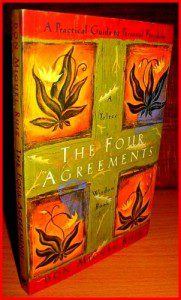
In “Cutting Loose: An Adult’s Guide to Coming to Terms with Your Parents” Howard M. Halpern calls the interactions that develop between the inner child in us and the inner child in our parents “songs and dances” because, he explains, they have a “repetitious, almost rhythmic, pattern. The same words, the same music and the same dance steps are performed over and over again.” Writes Halpern:
There is no underestimating the difficulty in modifying the song and dance routines you have developed with your parents, but as you become aware of just what the song and dance is that you and your parents perform so ritualistically, then you can begin to change the tune. Recognizing the nuances of interactions so habitual as to be almost beyond self-observation is no easy matter, but once you see the dance you can begin to change the words, the music, and the steps.
I’m in the process right now of having to choreograph a whole new dance. And with no training as a choreographer, that’s a little tough. Thankfully I have a team of mentors and caring friends that can help me identify the wrong moves–the clumsy turns and the ugly transitions–because my gestures are so ingrained in me that my body doesn’t want to do anything else. Like a kid with sensory-integration issues who has been walking on his tiptoes for the first five years of his life–his little legs locked in a position, not allowing him go down on his heels without lots of physical therapy–I’m stuck in an uncomfortable pose, and I don’t know how I got there.
But here’s my progress: I no longer think it looks right. Even as my thoughts follow certain pathways that have been carved over time, I now know there is another way, and that I can be a new beginning. I know now, to quote the words of French feminist Luce Irigaray: “I have an origin. I am an origin.”
I am an origin. Through lots of discipline, and cognitive behavioral therapy, and psychotherapy, I can begin new patterns of behavior for the generation after me: for David, Katherine, and their families. Granted, their gene pools afford them plenty of challenges, or should we say “character-building opportunities.” But, with diligent recovery and some help from the Holy Spirit, I can teach them a new dance based on integrity, truth, love, respect, and compassion.
Similar to the dance comparison that Halpern makes, my therapist shared with me the analogy of a backpack … You are carrying around these heavy stones most of your life. Something–um, let’s say a nervous breakdown–makes you assess what, exactly, is in this burdensome bag of yours. You look at the rocks and say, “Self, Why in God’s name am I carrying this?” So you toss one out. Then you get to mile seven, and ask yourself the same question: “Self, why in the hell is this in here? It’s not like I can eat it, drink it, or wrap myself in it. What is its purpose anyway?” Each few miles your baggage gets lighter with the right questions and follow through.
I guess this process has something to do with forgiveness. As Beyond Blue reader Frank Hulse shared with me in a recent e-mail, again a backpack analogy:
Forgiveness isn’t easy. It requires a conscious decision to change our minds and wipe the slate clean. But here’s the way to think about forgiveness. Picture yourself shouldering a backpack with a dozen 10-pound bags of potatoes. You make the decision to forgive someone–possibly yourself–but each time you forgive all you can manage is 10 percent forgiveness. You keep trying though and after ten separate attempts you finally achieve success and the person is forgiven. Each time you manage a bit of forgiveness your load drops by 10 pounds until eventually you’re no longer carrying that heavy load. It’s worth it even if you have to forgive someone ten times.
According to Halpern, the reward is worth it, if we can just keep on keeping on, making small revisions and alterations along the way:
Your determination will become stronger as you realize how much is at stake if you fail to make changes. Because what’s at stake is whether or not you will really own yourself, whether you will be self-animated or a puppet jerking to an endless song and dance, whether you will grow up or just grow older, whether you will spend uncounted time and energy hassling with and about your parents or whether you will free those energies for the realization of your own pleasures and potentials. A life is to be gained. New possibilities will emerge as the fear becomes less.

